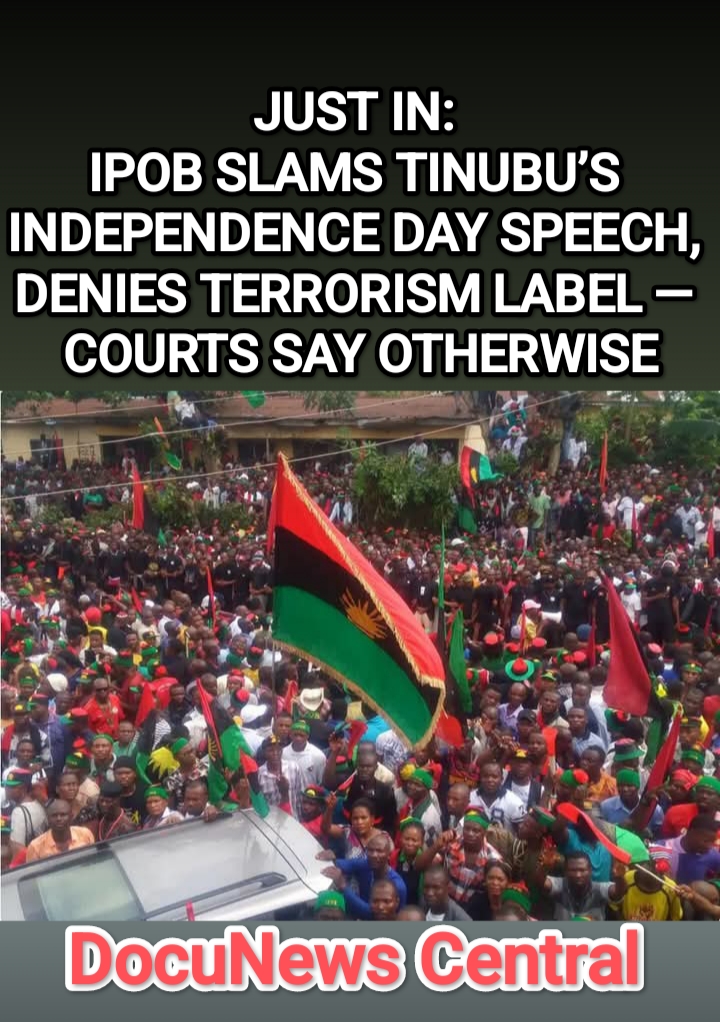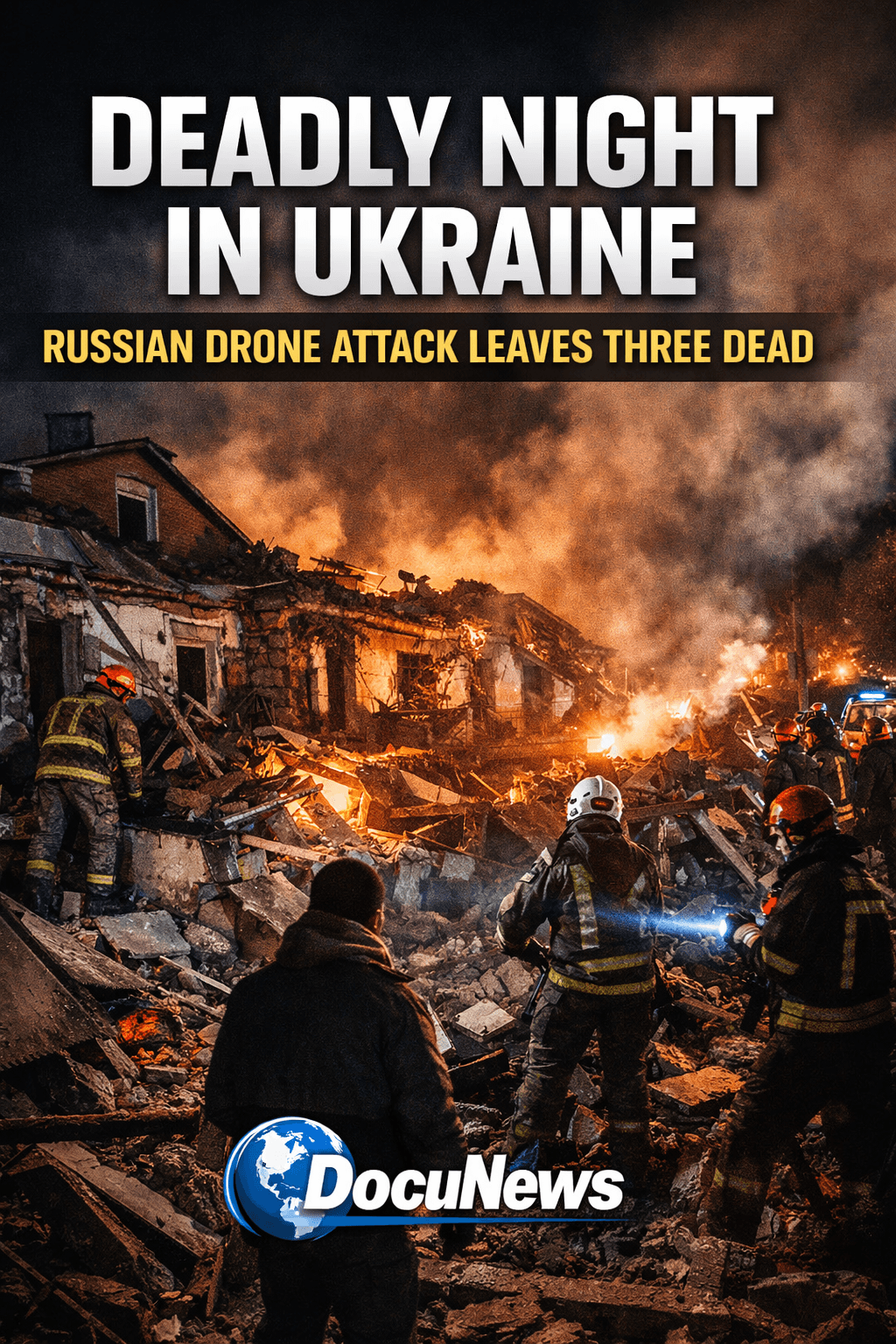
IPOB SLAMS TINUBU’S INDEPENDENCE DAY SPEECH, DENIES TERRORISM LABEL — COURTS SAY OTHERWISE
By DocuNews Central
Date: October 1, 2025
Lagos — The Indigenous People of Biafra (IPOB) has publicly condemned President Bola Ahmed Tinubu’s Independence Day address. In a statement, the group said it is a peaceful movement. It rejected claims that it is a terrorist group. The statement was signed by IPOB’s spokesman, Comrade Emma Powerful.
But the legal and security picture is not the same as IPOB’s words. Nigeria’s courts and some international reports show a different record. In recent months, courts have ruled on IPOB’s legal status and on criminal charges linked to its leaders. These rulings complicate the group’s public claim of peaceful intent. read also UK Report Worst Govern State in Nigeria docunewscentra;.com
IPOB’s public line: peace and self-rule
IPOB’s statement came after President Tinubu used parts of his Independence Day speech to talk about security. Tinubu named a list of groups and threats. He said security forces were making gains against bandits, Boko Haram, and separatist groups in the southeast. He also mentioned the fight against IPOB and its armed wing, the Eastern Security Network (ESN).
In reply, IPOB said the group stands for self-determination by peaceful means. The group said it rejects any label that paints it as a terror group. IPOB claimed that some past court rulings cleared it of being a terrorist organization. The group urged leaders in the southeast to speak up for the people.
What the government and courts say
The Nigerian government has repeatedly described IPOB as a threat to national security. That view has not been without legal battles. Most notably, the Court of Appeal in Abuja recently upheld a decision that proscribed IPOB as a terrorist organization. The appeal court’s ruling came after lower court actions and government filings. The court said the government acted within the law when it declared IPOB a proscribed group.
Also, key IPOB leaders face fresh and long-running court actions. Nnamdi Kanu, the movement’s best known leader, is facing terrorism charges in Nigeria. A recent court ruling said he must face trial on those charges. Kanu and his supporters say the cases are political and aimed at shutting down calls for Biafran independence. But the courts have treated the evidence as enough to proceed.
Why this matters now
Tinubu’s Independence Day speech came at a tense time. The economy is under strain from policy shifts. Security is also a top worry for many Nigerians. When a president names a group in a national speech, it shapes public view. Tinubu’s words reached millions. They will affect how people and agencies see IPOB and the southeast. Reuters and local outlets reported the president’s remarks and his claim that the “worst is over” on security and the economy.
IPOB’s denial and the courts’ rulings sit on opposite sides of the ledger. One side says “we are peaceful.” The other side says “the law says you are proscribed.” That split feeds fear and anger in communities on both sides. It also raises the risk of more arrests and clashes.
IPOB’s claims and the 2017 ruling
In its statement, IPOB referred to a Federal High Court decision from March 2017 as proof that the group was not a terror group. That reference is part of the group’s attempt to show a long record of lawful activism. But the legal trail since 2017 is complex.
After 2017, the government moved to proscribe IPOB under terrorism laws in various ways. Appeals followed. The Court of Appeal’s recent decision to uphold the proscription is a key step in that legal chain. The appeal court made clear that the earlier proscription stands. That has legal weight across the country.
How the media reported it
Major Nigerian outlets reported both the president’s speech and IPOB’s reply. Vanguard ran a story headlined, “IPOB condemns Tinubu’s Independence Day speech, rejects allegations of terrorism,” citing IPOB’s spokesman, Emma Powerful. Local TV and online news sites also carried the statement and the president’s comments.
International outlets have also tracked the legal fights. The Associated Press and Reuters published pieces on the court actions and on key arrests. AP covered the courts’ direction for Kanu to face terrorism charges. Reuters reported on Tinubu’s national address and the wider security claims. These reports give a steady, verifiable picture of events beyond social posts and local hearsay. legit.ng
Voices from the southeast
The southeast is watching closely. Some community leaders say they fear violence and heavy security measures. Others urge calm. Some of IPOB’s followers remain loyal to the idea of Biafra. They point to history and to long-running grievances. But many people in the region also report fear of being caught in a wider security sweep. The tension is real on the ground.
IPOB’s sit-at-home calls and some acts of disruption have angered traders and families. The group says such steps are peaceful protest. Critics say the same acts hurt ordinary people and local business life. This gap in view is one of the root causes of friction.
Legal experts weigh in
Lawyers say that a court ruling that upholds a proscription carries major consequences. Once a group is legally declared proscribed, its members and those who aid it can face serious charges. The law can also limit public gatherings and funding for the group. Experts warn that even when a group says it wants to be peaceful, the law often looks to acts and evidence, not words.
Other legal minds say that the rule of law must be clear. If courts have said IPOB is proscribed, then the justice system is likely to act on that finding. If IPOB believes a ruling is wrong, the path is to appeal and to use legal channels. But in practice, appeals can take years. Meanwhile, security responses continue.
Security forces and the government stance
The presidency and security agencies have framed the fight as one of national survival. They say the state must protect lives and property. The president’s speech stressed that progress is being made against violent groups and bandits. It praised the armed forces for gains in several troubled zones. This rhetoric signals the government’s intent to keep pressure on groups it sees as a risk.
Critics say the security focus must come with measures to heal divisions. They ask for more dialogue with communities. They warn that force alone will not end the grievances that feed separatist calls.
What IPOB wants
In its latest release, IPOB said the people of the southeast want true self-rule. The group said it will continue to push for the right to decide its future. It insists that such a fight can be nonviolent. It also pleaded for international attention and for local leaders to speak up for the region.
What the courts want
The Court of Appeal’s finding makes the legal posture clear. The court said the proscription of IPOB stands. With that in place, courts can pursue trials for leaders accused of crimes tied to the group. The recent ruling that Nnamdi Kanu must face terror charges shows how the courts are moving forward on that front.
Why international eyes are on this
The case attracts attention beyond Nigeria. Rights groups, diaspora communities, and foreign media watch how courts and the state handle separatist politics. Past history — including the Biafran war of the late 1960s — adds weight to the global concern. Any heavy-handed step risks broad backlash and calm in the region could be lost. Recent arrests and trials have thus drawn comment from human rights watchers and foreign journalists.
What to watch next
- Court moves: Watch for appeals, trial dates, and official filings. These will shape what happens to IPOB leaders.
- Security actions: Expect further patrols and operations in areas seen as hot spots. The military and police will likely keep pressure high.
- Political outreach: Any real effort to calm the region will need talks and new policies that touch on jobs and services. Observers hope political leaders will move toward talks, not just force.
Conclusion
IPOB’s statement after Tinubu’s speech makes one side clear: the group wants to be seen as peaceful. The courts and government make the other side clear: the group remains proscribed and its leaders face terrorism charges. The clash between those two messages will shape events in the weeks ahead. What happens next will matter for the southeast and for the whole country.
DocuNews Central note: This story is based on reports from Vanguard, Punch, Reuters, and the Associated Press. We will follow court filings and official updates as they come. For now, the facts show a split between IPOB’s public stance and recent court rulings that uphold its proscription.
This is DocuNews Central Reporting












One thought on “IPOB SLAMS TINUBU’S INDEPENDENT DAY SPEECH,”